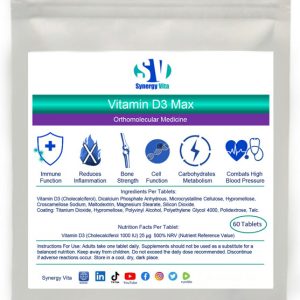Benefits of Magnesium Glycinate Formula (Magnesium & Glycine)
Supports heart health
Combats kidney stones
Important for energy production
Facilitates relaxation & combats anxiety
Improves quality of sleep
Combats high blood pressure
Supports bone and teeth health
Promotes gut function and health
Supports growth and wellbeing
Important for nerve function
Helps prevent stiffness and cramps
Combats diabetes
SYNERGY VITA MAGNESIUM & GLYCINE FORMULA
Support your wellbeing and health with Synergy Vita high-quality supplement formula. This supplement includes Magnesium and Glycine to nourish your body from within and enhance your health and wellness.
Nutrition Facts Per Serving, 3g (Half Teaspoon: – Magnesium – 423mg (112.8% NRV), Glycine – 2577mg.
Ingredients: Magnesium Glycinate.
Instructions for use: Adults mix half teaspoon of powder into at least 200ml (about 6 oz) of water or juice. This product must be diluted into a liquid before ingestion. Take once daily or as directed by a healthcare professional.
IMPORTANCE OF MAGNESIUM
Magnesium is an essential micronutrient used by every organ in your body, especially your heart, muscles, and kidneys, and plays several important roles in the body.
Energy Production
The body needs a constant supply of energy to fuel the myriad of biological functions. Food is not utilised directly as an energy source, instead it is broken-down through numerous metabolic reactions, and the energy is harnessed to form Adenosine Triphosphate (ATP), which is the energy currency that powers the countless physiological processes.
However, ATP utilisation by the body as the main source of energy requires that ATP is bound to a Magnesium ion in order to be biologically active. What is generally called ATP is often actually Mg-ATP. Thus, Magnesium plays a key role in energy production.
Muscles and Heart Function
The heart needs to contract and relax rhythmically, in order to supply adequate amount of blood for tissue perfusion. Calcium is important for muscle contraction, while magnesium is critical for muscle relaxation, including the myocardium (heart muscle). Insufficient amount of magnesium influences the ability of muscles to function and relax. Magnesium counteracts the negative effects of excess of calcium, which can lead to muscle spasms and heart attack. In fact, the amount of magnesium in the heart is high, especially in the left ventricle. Magnesium can help reduce palpitation, tachycardia and the risk of fibrillation.
Smooth Muscles Function and Hypertension
Magnesium is essential for the relaxation of smooth muscles, including those in the arteries walls. If magnesium is insufficient, the smooth muscle in the arteries are unable to relax, leading to vasoconstriction and hypertension (high blood pressure). Magnesium helps combat hypertension because it is a natural calcium channels blocker.
Mental Health
There is evidence suggesting that among people aged 15-44, depressive disorders are highly prevalent, and are a major cause of disability worldwide. The aetiology of mental disorders can be complex, and for the prevention and treatment, it is important to implement a multidisciplinary approach that included different therapeutic components. It is also important to increase public awareness and eliminate the stigma about mental problems.
Research has revealed that nutrition and certain micronutrients can play a significant role in the prevention and treatment of brain-based disorders, particularly depression. Magnesium represents a micronutrient that is critical for the proper activity of numerous biological processes, including DNA replication, transcription and translation. Moreover, Magnesium is a bivalent intracellular cation that acts as an activator or as a coenzyme for numerous enzymatic systems, including those that are important for proper brain function. Therefore, it is essential to ensure adequate daily intake of this essential micronutrient in order to optimise brain function and help prevent mental problems.
Anxiety & Stress
Magnesium is an essential mineral that plays various key roles for promoting your overall health and wellbeing. Inadequate levels and deficiency of Magnesium is a very common problem, impacting negatively on mental and physical health and performance.
Research has demonstrated that Magnesium can improve symptoms of stress and anxiety through different biological mechanisms.
Cortisol is a steroid hormone produced and released by the adrenal glands, which affects several aspects of your body, and is involved in the response to stress. Magnesium is important for improving the stress response and balance the levels of cortisol. Inadequate Magnesium levels can result in increased stress, and higher levels of mental or physical stress increases Magnesium depletion, resulting in very low levels of this key mineral.
Neurotransmitters are chemical messengers needed for normal function of the nervous system. Magnesium can help to control neurotransmitters in the brain, with a calming effect on your body.
Tension & Sleep
Elevated stress and anxiety levels are associated with muscle tension. Magnesium is critical for normal muscle function and helps muscle tissue to relax. Low levels of Magnesium often leads to increased muscle tension and cramps.
Magnesium also contribute to a better night’s sleep, by regulating the neurotransmitter gamma-aminobutyric acid (GABA), which is important for sleep.
Other Properties of Magnesium
Magnesium has pleiotropic effects and is a pivotal nutrient involved in over 325 enzyme reactions in the body, ranging from cholesterol control to energy production.
Magnesium is crucial for normal nerves function, blood sugar control and blood pressure regulation.
Magnesium is one of the most important mineral in the body, and is involved in nerves and muscles function. This mineral is essential for DNA repair and cancer prevention, as well as for the digestion of proteins, carbohydrates and fat.
Magnesium is a key therapeutic component for preventing and treating high blood pressure, diabetes, high cholesterol, cardiovascular diseases, osteoporosis and many other serious health conditions.
Magnesium Tests
Only 1% of the Magnesium is in the blood, and there rest is in other tissues, especially in the bones. Thus, a person can be magnesium deficient even though the level in the blood is normal. Only the test that measures magnesium in the red blood cells provides a good indication of Magnesium levels.
Deficiency of Magnesium is associated with heart palpitation, irregular heartbeat, hypertension, muscle cramps, weakness and fatigue, depression, constipation, high cholesterol level, calcium deposited in soft tissues, such as kidney stones. Patients with diabetes tend to have low Magnesium levels.
IMPORTANCE OF GLYCINE
Glycine is an amino acid required for various physiological processes in the body, including the production of enzymes, fat metabolism and synthesis of DNA and RNA.
Glutathione Production
Glutathione is a substance involved in building and repair of tissue, synthesis of chemicals and proteins required in the body, and in immune system function.
Glutathione is often called the master antioxidant that opposes the pro-inflammatory signalling and oxidative damage.
Glycine is a key amino acid for Glutathione production that occurs in the liver. Optimising cellular glutathione levels can have broad utility in the prevention and treatment of disorders driven by oxidative stress, promoting health and wellness.
Quality of Sleep
The findings from a study demonstrated that taking the amino acid glycine before bed improved the quality of sleep in individuals with sleep complaints.
Collagen Synthesis
Glycine and other amino acids are the building blocks of proteins; therefore, it is no surprise that collagen is comprised of amino acids.
Glycine is a key component of collagen, which accounts for about 30% of your body’s protein. Collagen is extremely important as it provides structure, support and strength to your skin, bones, muscles and connective tissues.
Mental Health
Research showed that high-dose of Glycine can improve certain symptoms of schizophrenia, by augmenting the efficacy of antipsychotic medications in schizophrenia.
Brain Function
There is evidence to suggest that Glycine administration can help improve cognitive function and memory.
BECOMING NUTRIENT DEFICIENT IS EASY AND MORE COMMON THAN YOU THINK
Suboptimal or deficiency of micronutrients is a very common problem, with adverse effects on health and wellbeing. The factor that contribute to inadequate levels of nutrients include:
- Soil impoverishment (less amount of micronutrients)
- Food processing (micronutrients are removed)
- Infection (increased need of micronutrients to combat disease)
- Reduced absorption because of gastrointestinal conditions
- Toxic substances use (they reduce bioavailability and they deplete micronutrients)
- Inflammation (elevated requirements of micronutrients)
- Injury (increased needs for micronutrients)
- Environmental toxicity (they reduce bioavailability and they deplete micronutrients)
- Age (reduced absorption of micronutrients)
- Oxidative stress (increased requirements of micronutrients)
- Alcohol consumption (increased excretion of micronutrients)
- Physical activity (increased need for micronutrients)
- Fighting disease (increased requirements of micronutrients)
- Microbiome alterations (altered absorption of micronutrients)
- Genetic polymorphism (impaired absorption and utilisation of micronutrients)
WHY CHOOSE SYNERGY VITA MAGNESIUM GLYCINATE FORMULA?
Synergy Vita high quality Magnesium Glycinate Formula is made with a blend of active ingredient, which work in concert to support your health and help you thrive.
DECADES OF RESEARCH & EXPERIENCE
Synergy Vita products are based on scientific evidence. Our physiologist PhD, conducts extensive research to identify natural solutions for optimising physiological functions to help individuals stay fit and healthy.
Synergy Vita Products Highlights:
- Based on scientific evidence
- Carefully designed and crafted
- High strength
- Manufactured in the UK
- High standard production
- Using cutting-edge technology
- High quality & purity ingredients
- Balanced formulations
- Packaged to reduce plastic waste
- Designed to optimise nutrients intake
If optimising nutrients intake with premium quality products is important to you, you’re in the right place!





Ivana Betic –
For anyone seeking a highly effective and absorbable magnesium supplement, this magnesium glycinate is an unparalleled choice that consistently delivers remarkable results.
I felt a profound improvement in sleep quality, experiencing deeper, more restorative rest, alongside significant reductions in muscle cramps, tension, and the pervasive effects of daily stress.
Great quality supplement, and highly recommended solution.
Peter F. –
This excellent Magnesium and Glycine Supplement is a foundational cornerstone for comprehensive health, delivering an essential micronutrient utilized by virtually every organ.
Magnesium is particularly critical for the optimal function of your heart, muscles, and kidneys, where it underpins vital processes such as energy production, nerve function, and muscle relaxation.
The inclusion of Glycine further elevates its efficacy, synergistically supporting restful sleep, a calm nervous system, and overall cellular health. Consequently, incorporating this powerful supplement is indispensable for maintaining robust physiological balance and enhancing overall well-being.